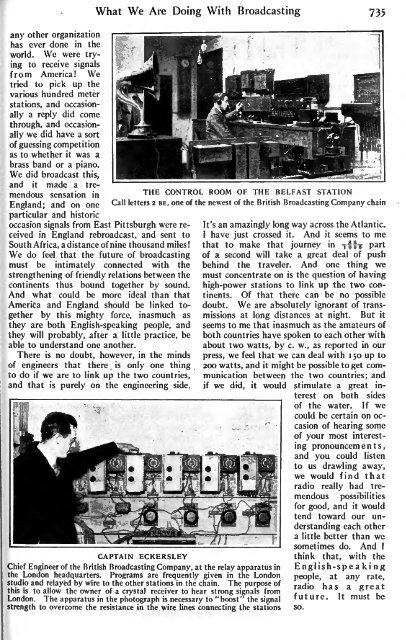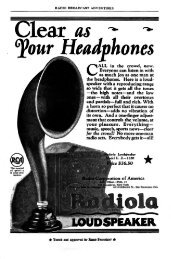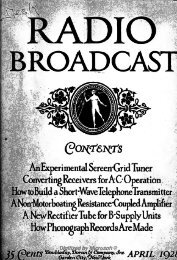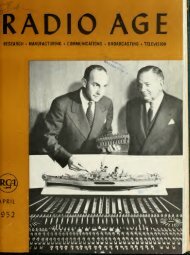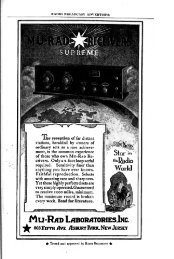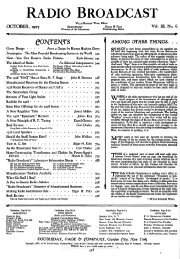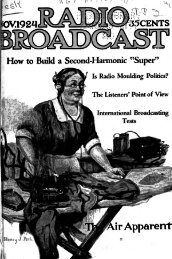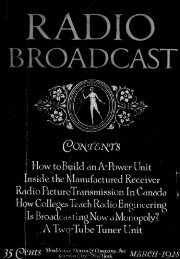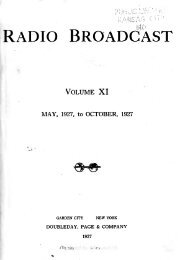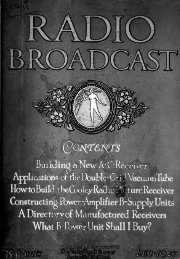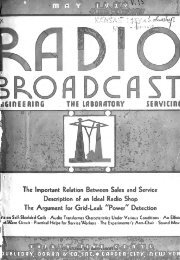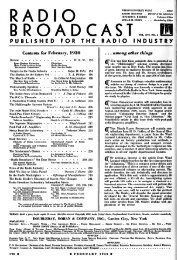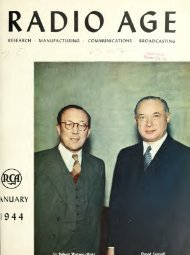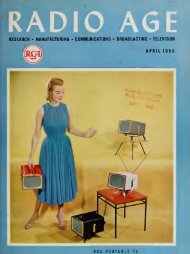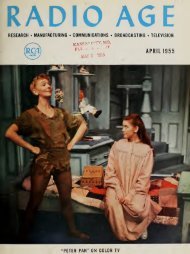Radio Broadcast - 1925, February - 113 Pages ... - VacuumTubeEra
Radio Broadcast - 1925, February - 113 Pages ... - VacuumTubeEra
Radio Broadcast - 1925, February - 113 Pages ... - VacuumTubeEra
You also want an ePaper? Increase the reach of your titles
YUMPU automatically turns print PDFs into web optimized ePapers that Google loves.
What We Are Doing With <strong>Broadcast</strong>ing 735<br />
any other organization<br />
has ever done in the<br />
world. We were trying<br />
to receive signals<br />
from America! We<br />
tried to pick up the<br />
various hundred meter<br />
stations, and occasionally<br />
a reply did come<br />
through, and occasionally<br />
we did have a sort<br />
of guessing competition<br />
as to whether it was a<br />
brass band or a piano.<br />
We did broadcast this,<br />
and it made a tremendous<br />
sensation in<br />
England; and on one<br />
particular and historic<br />
occasion signals from East Pittsburgh were received<br />
in England rebroadcast, and sent to<br />
South Africa, a distance of nine thousand miles!<br />
We do feel that the future of broadcasting<br />
must be intimately connected with the<br />
strengthening of friendly relations between the<br />
continents thus bound together by sound.<br />
And what could be more ideal than that<br />
America and England should be linked together<br />
by this mighty force, inasmuch as<br />
they are both English-speaking people, and<br />
they will probably, after a little practice, be<br />
able to understand one another.<br />
There is no doubt, however, in the minds<br />
of engineers that there is<br />
only one thing<br />
to do if we are to link up the two countries,<br />
and that is<br />
purely on the engineering side.<br />
THE CONTROL ROOM OF THE BELFAST STATION<br />
Call letters 2 BE, one of the newest of the British <strong>Broadcast</strong>ing Company chain<br />
It's an amazingly long way across the Atlantic.<br />
I have just crossed it. And it seems to me<br />
that to make that journey in -rfihr P art<br />
of a second will take a great deal of push<br />
behind the traveler. And one thing we<br />
must concentrate on is the question of having<br />
high-power stations to link up the two continents.<br />
Of that there can be no possible<br />
doubt. We are absolutely ignorant of transmissions<br />
at long distances at night. But it<br />
seems to me that inasmuch as the amateurs of<br />
both countries have spoken to each other with<br />
about two watts, by c. w., as reported in our<br />
press, we feel that we can deal with 150 up to<br />
200 watts, and it<br />
might be possible to get communication<br />
between the two countries; and<br />
if we did, it would stimulate a great interest<br />
on both sides<br />
of the water. If we<br />
could be certain on occasion<br />
of hearing some<br />
of your most interesting<br />
pronouncements,<br />
and you could listen<br />
to us drawling away,<br />
we would find that<br />
radio really had tremendous<br />
possibilities<br />
for good, and it would<br />
tend toward our understanding<br />
each other<br />
a little better than we<br />
sometimes do. And I<br />
CAPTAIN ECKERSLEY<br />
think that, with the<br />
Chief Engineer of the British <strong>Broadcast</strong>ing Company, at the relay apparatus in English-speaking<br />
the London headquarters. Programs are frequently given in the London<br />
people, at any rate,<br />
studio and relayed by wire to the other stations in the chain. The purpose of<br />
radio has a<br />
this<br />
great<br />
is to allow the owner of a crystal receiver to hear strong signals from<br />
London. The future. It apparatus in the must be<br />
photograph is necessary to "boost" the signal<br />
strength to overcome the resistance in the wire lines connecting the stations so.


